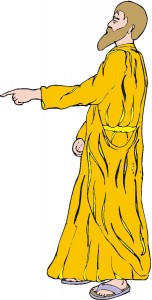The Basis Requirements for Being a Prophet of Elohim
The Torah reveals the basic requirements of a prophet. If a person is a prophet, YHVH will reveal himself to a person as per the instructions Numbers 12:6 (see also Jer 23:28). The context of these instructions was the misuse of the mouth in accusation against an elder in Israel. Evidently, Aaron and Miriam (who was a prophetess, Exod 15:20) thought they had gotten a prophetic word from Elohim and felt justified in correcting Moses on that basis. They were wrong and YHVH’s punishments were swift and severe.
There Are Eleven Levels of a Prophet
A little known fact in modern-day church prophetic circles is that the Bible reveals that there are eleven levels of a prophet. The list below is adopted from The Guide to the Perplexed (by Moses Maimonides [or the Rambam] pp. 241–245.) Most so-called prophets in the church if they are on the list of the requirements for being a true prophet are at the lowest levels. This fact alone should cool the prophetic jets of most who think they’re Elohim’s elect and anointed prophet to the body of Yeshua. In reality, considering Israel’s long history, the Scriptures reveal that there were very few Elohim-sent prophets. Long periods of time passed without there being a true prophet of Elohim in Israel. There was no shortage of false and carnal-minded prophets, however. Now here’s the list:
- 1— Divine assistance given to a person to induce or encourage him to do something good and grand (e.g. Judg 2:18; 1 Sam 11:6; 1 Chr 12:18; Exod 2:17; 1 Sam 16:17). Scripture often records this occurrence when it states, “And the Spirit of YHVH came upon so and so…”
- 2 — The person feels as if something came upon him, and as if he had received a new power that encourages him to speak. Such a person is said to speak by the Set-Apart Spirit. The books of Psalms, Proverbs, Ecclesiastes, Song of Solomon, Daniel, Job, Chronicles and the rest of the Ketuvim (Writings or Hagiographa) were written under the inspiration of the Set-Apart Spirit. See also 2 Sam 23:2; Num 11:25; 2 Chron 20:14–15; Num 23:5; etc.) Often prefaced by the phrase, “The Spirit of YHVH spoke to me…” or “So and so prophesied…”
Below are the levels of a prophet. Not all people who have these experiences are prophets. Those who hold the biblical office of a prophet will experience these things Continue reading






